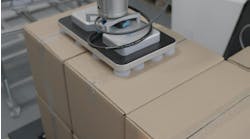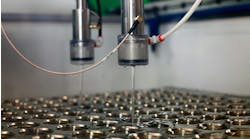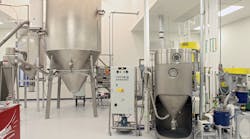SINTX Technologies, Inc., an original equipment manufacturer of silicon nitride ceramic for medical and non-medical applications, announced progress toward the manufacture of a “catch-and-kill” mask that will inactivate respiratory viruses. Exposure to silicon nitride has been shown to neutralize several bacterial species and viral strains.
The company said that it has successfully dispersed and embedded silicon nitride particles into nonwoven and woven fabric fibers. Optimization of this process, fabric safety and efficacy testing, and manufacturing scale-up are the next steps beyond this critical milestone.
“By investing in our human resources and equipment, we expedited this development in-house, rather than relying on outside parties,” said Dr. Bal, President, and CEO of SINTX Technologies. “The attached scanning electron image shows silicon nitride particles preferentially bonded to polypropylene fibers, at the micron level, without stray particles. Fabrics containing silicon nitride from this process will be tested for their antiviral effect. Previous scientific data have shown that silicon nitride strongly inactivates SAR-CoV-2, the virus causing the COVID-19 pandemic.”
“Initial process development activities have shown promising results and we are hopeful that we will soon have a mask that catches and kills the coronavirus,” said Bruce Lorange, CEO of O2TODAY, who has an agreement with SINTX to develop and commercialize antimicrobial face masks. “We are excited by the rapid progress we are making and looking forward to sharing more updates as we have them.”
“We believe that the consumer market for a face mask capable of inactivating bacteria and viruses extends well beyond the present concerns about COVID-19,” said Dr. Bal. “In densely-packed Asian cities, for example, respiratory viruses and air pollution are common health concerns, and protective mask use existed even before COVID-19. Similar concerns may endure in Western countries as well, long after a COVID-19 vaccine is freely available. We believe that our antipathogenic masks and the underlying fabric technology will have lasting consumer demand.”











